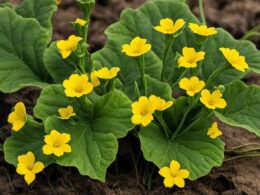Are you tired of struggling to get your garden to grow? Do you want to ensure the health and success of your plants? Look no further than seed soaking!
Seed soaking is a simple yet effective technique that can lead to faster germination, better crop control, and healthier growth. By soaking your seeds before planting, you can remove natural chemicals that can inhibit growth and soften up hard outer casings for easier sprouting.
This tried-and-true gardening method can save you time and ensure that older or very dry seeds will still germinate. Plus, it gives your vegetable gardens extra time to reach full maturity and produce a more robust harvest.
So why not give seed soaking a try and unlock the secret to faster, healthier growth for your garden?
Quick Takeaways
- Seed soaking can lead to faster germination and healthier growth.
- Soaking seeds can remove natural chemicals that inhibit growth and ensure older or very dry seeds will germinate.
- Not all seeds need to be soaked, and oversaturating seeds with water can cause them to swell up or grow mold.
- Seed soaking can be especially beneficial for gardeners in regions with short growing seasons and can give vegetable gardens extra time to reach full maturity and a more robust harvest.
Can Soaking Seeds Help Speed Up the Drying Process of Tung Oil?
Soaking seeds before extracting tung oil does not contribute to making tung oil dry faster. The drying process of tung oil primarily depends on exposure to oxygen, which causes it to form a hard film. However, soaking seeds can be beneficial for other purposes, such as facilitating the extraction of the oil or improving its purity.
Benefits of Soaking
You’ll be happy to know that soaking certain seeds, like beans, corn, and cucumber, can lead to faster germination and healthier growth, among other benefits.
Soaking seeds can soften the hard outer casing, making it easier for the plant to sprout. It also removes natural chemicals that can inhibit growth and ensures that older or very dry seeds will germinate.
When soaking seeds, it’s important to choose the best seeds to soak, like beans, corn, pumpkin, squash, cucumber, peas, beets, chard, and cilantro. However, some seeds, like celery, lettuce, spinach, turnips, carrots, and radish, should not be soaked.
Additionally, be careful not to oversaturate the seeds with water as it can cause them to swell up or grow mold. By avoiding these common mistakes, you can ensure that your seeds will sprout quickly and grow into healthy plants.
Seed Soaking Process
To start the seed soaking process, fill a bowl with warm water and let the seeds soak for 3-48 hours, depending on the type of seed. It’s important to note that not all seeds need to be soaked. The best seeds to soak include beans, corn, pumpkin, squash, cucumber, peas, beets, chard, and cilantro. On the other hand, celery, lettuce, spinach, turnips, carrots, and radish are seeds that should not be soaked.
To ensure successful seed soaking, follow these tips. First, use warm water to speed up the soaking process. Second, make sure not to oversaturate the seeds with water as this can cause them to swell up or grow mold. Third, strain the seeds out and plant them immediately after soaking. Lastly, scarification may be necessary for very tough seeds. By following these seed soaking tips and choosing the best seeds to soak, you’ll ensure faster, healthier growth for your plants.
Key Points to Remember
Remember that not all seeds need to be soaked, but for those that do, it can be a time-saving and beneficial method for your garden. Here are three key points to keep in mind when considering seed soaking:
-
Seed soaking time: Most seeds only need to be soaked for 3-12 hours, but some may require up to 48 hours. Be sure to research the specific seeds you plan to soak to ensure you soak them for the appropriate amount of time.
-
Seed soaking alternatives: If you don’t have the time or resources to soak your seeds, there are alternative methods you can use to help with germination, such as scarification or stratification.
-
Consider your growing region: Seed soaking can be especially beneficial for gardeners in regions with short growing seasons, as it can give your plants a head start and more time to reach full maturity.
By keeping these points in mind, you can make an informed decision about whether or not to soak your seeds and ensure a successful and healthy garden.
Frequently Asked Questions
Can soaking seeds for too long have negative effects on germination?
Soaking seeds for too long can have both pros and cons. The optimal soaking time is usually 3-12 hours. Oversaturating seeds with water can cause swelling or mold, but soaking can improve germination rates and growth.
Are there any specific types of water that should be used for seed soaking?
For best results when soaking seeds, use filtered water. Comparing water temperatures, warm water speeds up the process. Keep it simple by sticking to these rules. Enjoy a safe and effective gardening experience.
Are there any seeds that should be soaked for longer than 48 hours?
For most seeds, soaking for 3-12 hours is sufficient. Long term soaking may have drawbacks such as mold growth and reduced viability. Best practices for seed soaking time include checking seed viability and using warm water.
Can soaking seeds increase the risk of disease or pests in the garden?
Is Seed Soaking Risks: Disease & Pests Myth or Reality? While it can increase germination rates and growth, oversaturating seeds or leaving them too long can attract pests and disease. Balance the benefits with the risks.
How does seed soaking affect the taste or quality of the harvested produce?
Seed soaking doesn’t directly affect flavor or nutrient density. However, healthier plants from seed soaking may produce better-tasting produce. Soaking seeds can still improve overall plant growth and increase yield, making it worth considering.
Conclusion
So there you have it, gardener! Seed soaking is a simple and effective way to improve your gardening success. By soaking your seeds before planting, you can speed up the germination process, get better control over your crops, and ensure healthier growth.
Plus, it’s an easy way to remove natural chemicals that can inhibit growth and soften up hard outer casings for easier sprouting. To soak your seeds, simply place them in a container of water and let them sit for a few hours or overnight. Then, drain the water and plant your seeds as usual.
Remember to keep your soil moist and provide plenty of sunlight to give your plants the best chance of success. With seed soaking, you can give your vegetable garden the extra boost it needs to reach full maturity and achieve a more robust harvest.
Happy gardening!








